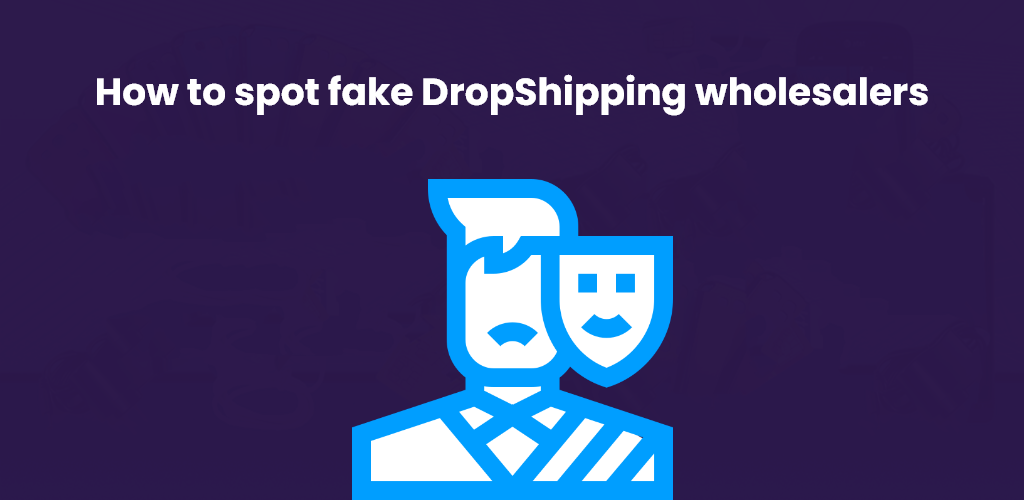How to spot fake DropShipping wholesalers
If you’re just starting out in eCommerce and you want to scale your business quickly – and who doesn’t – then it is easy to want to rush. But if you’re not careful, it can be easy to get caught out by scammers that show up as DropShipping suppliers and DropShipping wholesalers, and end up out of pocket. And if you’re really unlucky, it might not become clear that they are scammers until you’ve received an order from a customer, which might mean you have to cancel their order, or you might have to refund them from your business.
Luckily, there are a few ways that you can spot these scams, and in this post, we’re going to cover how you can reduce the chances of getting stung by a scammer.
The website doesn’t look professional
Twenty years ago, it was much easier to get caught out by a scam website, because there were so many legitimate websites that looked poorly built. Today, it is much easier to create a great website, but there are details you can look for to give you an indication. The odd typo is forgivable, but poor spelling, punctuation, and grammar are a key indicator for overseas scammers trying to catch you – especially if the website says that the business is based in the UK.
All that said, many legitimate wholesalers have basic, streamlined websites that aren’t fancy and may look dated – and so it is well worth looking for these other clues.
Their contact details are scarce
Before you start looking for the products you want, check to see if they have contact details available. Legitimate businesses – even those who don’t want customers going to their workplace – publish their address, phone number, email addresses and social media handles, as well as WhatsApp or Facebook Messenger contact details. If you only spot a ‘Contact Us’ form without these other key pieces of information, then there’s a good chance you’re dealing with a scammer.
Further, if they claim to be a UK-based company, you should be able to find them on the Companies House search, and there should be details about when the company was formed, where they are registered, and who is involved with the company.
Their reviews are sketchy
You probably don’t buy anything online yourself without at least checking a couple of reviews – and you’re likely to pick a product that has loads of reviews over one without any at all. The same should go for choosing wholesalers and suppliers. When you google the name of the company, you should find plenty of reviews, especially on websites like Trustpilot and Feefo – and pay attention to the poor reviews.
Likewise, if you can’t find any reviews at all, that’s another red flag – especially if they claim to have been in business for years – so be cautious.
They sell direct to the public
Wholesalers do not sell direct to the public – and if they claim to, and offer the ‘wholesale price’ to any customer, they’re just a retailer. You can source from other retailers, but the problem with this is that you’re not going to make the margins on products you source from them. Customers will simply search for the product they want, and then buy from the seller that has the lowest price, and the most reviews – which will be them.
They claim they always have high margins
There isn’t a single wholesaler that can guarantee high margins on their inventory. The nature of eCommerce is that prices fluctuate, and the lowest price wins – and given that you set the price you’re going to charge your customers, they can’t guarantee high margins. Do your research carefully before you fall into those traps.
They’ll try to dodge providing samples
Legitimate suppliers and wholesalers won’t hesitate to send you samples, or complete a test order for you. If they try to get out of this process, or they want extra time to send, then chances are you’re looking at a scammer. Be careful with this one.
They want to charge you to hold inventory
Don’t fall for this one. Suppliers and wholesalers work with businesses that are DropShipping on a per-order basis, and they get paid when you place the order with them. They don’t have any reason to hold stock for you, especially if they’re working with other sellers. And while we’re talking about paying, you shouldn’t need to pay for a monthly service charge, pre-order fees, or minimum order sizes – you’re placing each order one at a time, and that’s when you pay.
Their terms of working with businesses that are DropShipping are unclear
If they’re legitimate DropShipping wholesalers, they will make everything super clear about the way in which they work. Their processes, including payments, will be set out clearly, and you won’t have any doubts about how you’ll place orders, and interact with the company if you need to.
They don’t know about your niche – even if it looks like they should
Most suppliers and wholesalers, even if they have don’t have the products you’re looking for, will have a good idea about the niche you’re operating in – and they’ll be up-front with you if they don’t.
Of course, if you speak to someone that claims to be a wholesaler and they don’t know specifics about DropShipping processes, run for the hills – they’re definitely running a scam!
There are a lot of dodgy people out there trying to make a fast buck out of DropShipping. It is partly why DropShipping has acquired a bit of a reputation for being a scam! Of course, it isn’t, but you have to know how to find great DropShipping suppliers, so you don’t end up losing money. Check out our post about how to find great DropShipping suppliers, or simply sign up for Avasam to take all of those worries away – we verify all our suppliers and their inventory before we allow them on the platform. You’ll never have to wonder if your customer’s order has arrived, and if you’re going to end up out of pocket.


DropShip products from verified suppliers to diversify your inventory and scale your eCommerce business